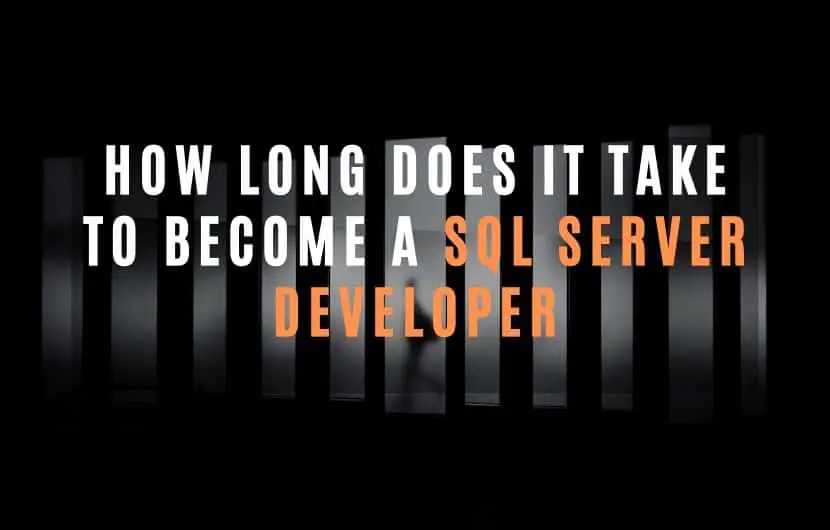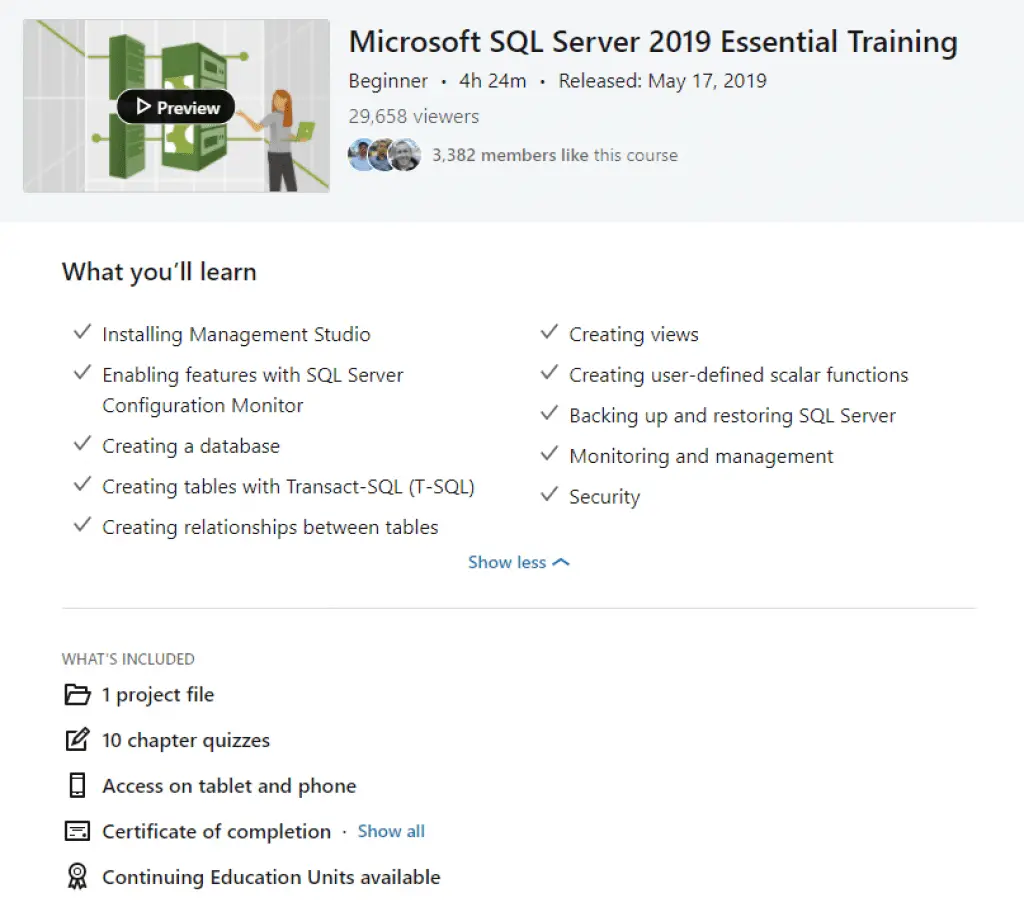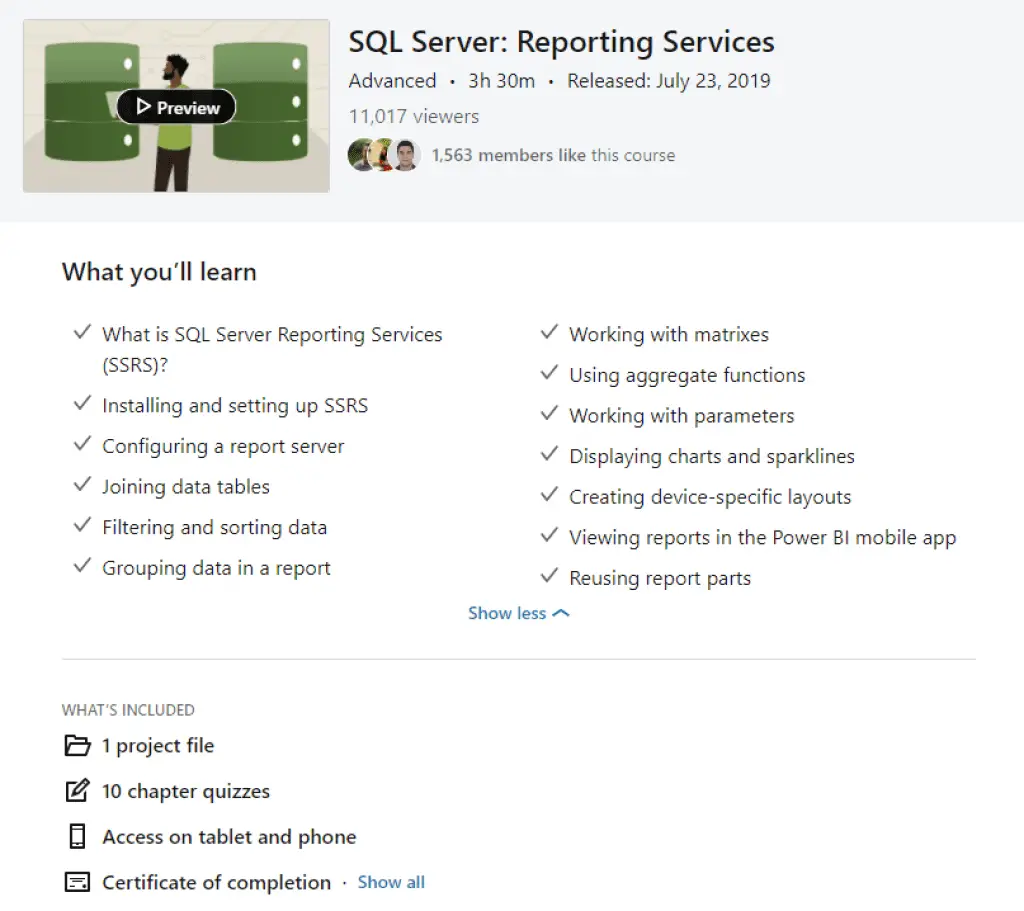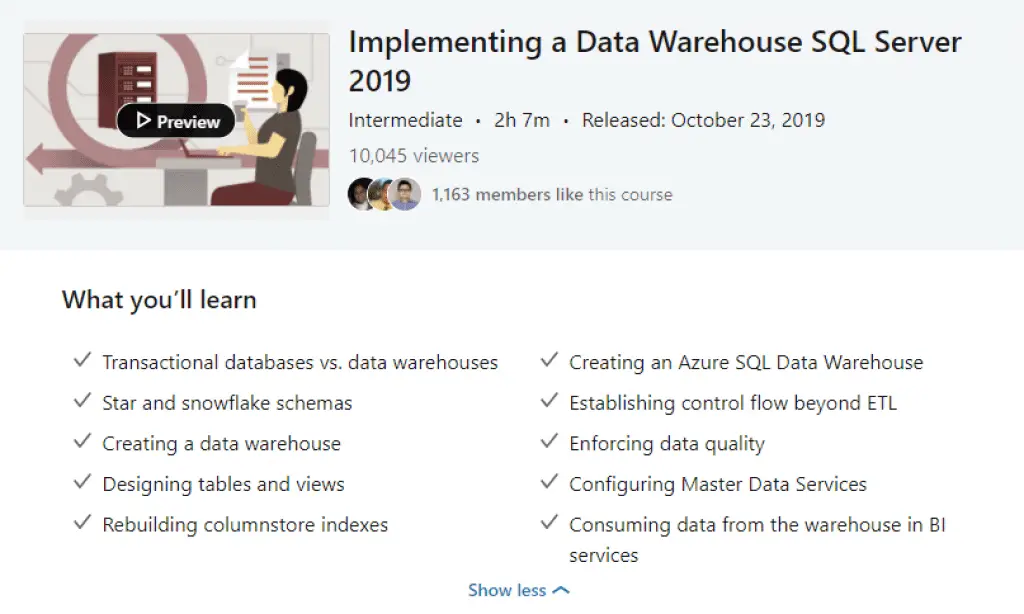When you think about how long it takes to become a SQL Server Developer, you probably have in mind how long it will take for you to be able to land a job in the position of SQL Server Developer.
To give you a quick answer straightaway, you can become a SQL Server Developer in 9 months by gaining the following skills (based on my own experience and the real job advertisement):
[wpsm_list type=”arrow”]
- You need to learn SQL (or T-SQL, if you like) – achievable in 2 months
- You need to learn SQL Server Reporting Services – achievable in 2 weeks
- You need to learn SQL Server Integration Services – achievable in 2 months
- You need to learn SQL Server Analysis Services – achievable in 2 months
- Nice to have skills: PowerBI and/or Tableau – both achievable in 2 months
[/wpsm_list]
Total learning duration to become a SQL Server Developer is 8 months and 2 weeks.
There are a lot of fairy-tale blogs out there that suggest you can become a SQL Server Developer in 2 years, while some of them bump that up even longer — 5 years. That’s crazy! In this article, we will dig out some real-world answers, based on the real job requirements for Junior SQL Developer positions, and my own experience.
[wpsm_toplist]
How long it will take to become a SQL Server Developer
Well, first, we need to know what are the essential skills that the SQL Server Developer must have to be able to work in such a position.
As I used to work as a SQL Server Developer for about a year, and so I believe I can tell you something about the specifics of such a job. It’s not just about querying databases and producing reports for managers and whatnot. It’s more than that. So let’s have a look at what skills you need to have.
Skill Requirement #1: Learning SQL – 1-2 months
It’s the most obvious one. The Structured Query Language is a standard query language used in all relational database engines, whether it’s Microsoft SQL Server, MySQL, MariaDB, PostgreSQL, Oracle database, etc. Because we are talking about the SQL Server developer position, the majority of your time at work, you will most likely be spending on querying the Microsoft SQL Server databases.
When I started my familiarity with the SQL Server, the latest version of it was SQL Server 2005. Just a bit later, the company has upgraded to SQL Server 2008 (R2).
To be able to work on daily tasks at the company of that time, I had to learn SQL Server development in full mode. So, here’s a recommended list of what you must know as a SQL Server Developer:
[wpsm_list type=”arrow”]
- Database design. It’s a fundamental thing in database programming. Make sure you know how to create database tables or views.
- Relationships. Tables can have various types of relationships. Make sure you know them all and how to choose between them.
- Data types. When creating database tables, you’ll have to choose the right data types for the columns. They play a very important role in terms of performance and efficiency.
- Joins. No step further without joins.
- CTEs / Correlated queries / Subqueries. This will enable you to run complex queries.
- Indexes. This is also an essential part of any SQL database. Indexes can also cause performance issues if wrongly used.
- DML / DDL queries. A fundamental part of database programming.
- Stored Procedures / Functions / Triggers. These are also essential database objects that you need to know about very well. I used them every day except for triggers. Speaking of which, make sure you pay extra attention to triggers though, they can be dangerous.
- If you want to go fancy, you can also learn SQL Agent Jobs (very useful), Service Broker, Mail. In my experience, I only used the SQL Agent Jobs.
[/wpsm_list]
SQL is a fundamental skill you need to master if you want to become a SQL Server Developer. Personally, learning SQL, I find it interesting and fun. If you are learning on your own and at your own pace, it won’t take you longer than 2 months. If you work in a company, then you can learn SQL programming in 1 month (and if you have friendly, willing-to-help colleagues!). In general, SQL is easy to learn and can be learned on the go.
Online courses that will fast-forward your SQL learning:
[wpsm_list type=”arrow”]
- Microsoft SQL Server 2019 Essential Training
- Querying Microsoft SQL Server 2019
- Learning SQL Programming
- SQL Server: Triggers Stored Procedures and Functions
- SQL Server Performance for Developers
[/wpsm_list]
Skill Requirement #2: SQL Server Reporting Services – 2 weeks
When thinking of how long it takes to become a SQL Server Developer, we must take into account things like learning the full stack of software that comes with the SQL Server.
The SQL Server Reporting Services, or the SSRS, is a useful tool that is used to produce rich, browser-based reports. Learning SSRS is a painless and fairly quick process.
What I also like about the SSRS is that it connects to the Microsoft SQL Server. So everything you have learned about the SQL programming previously will be re-used here.
If you are thinking something like this: oh no! More programming!
Well, I’ve got some good news for you. SQL Server Reporting Services isn’t about programming. It’s all about clicking buttons within the UI of the report. It’s interesting to see how much you can achieve by just clicking buttons! Personally, I have learned SSRS on the go and I haven’t dedicated any time specifically for that. If you prefer to learn at your own pace and on your own time, you can do it within 2 weeks.
Online course that will fast-forward your SSRS learning:
[wpsm_list type=”arrow”]
[/wpsm_list]
Skill Requirement #3: SQL Server Integration Services – 2 months
You may be thinking: Integration services… what? SQL Server Integration Services, or in short the SSIS, is a great tool for ETL. The ETL stands for Extract / Transform / Load. Not every company uses this tool because not all of them require ETL processes.
SSIS is a bigger tool than the SSRS — hence it takes longer to learn. Most often, you won’t need to learn any extra programming language to use this tool, however, sometimes there are situations where the built-in functionality that comes with the tool doesn’t suffice. For that, SSIS components can be extended by writing C# scripts. By the way, I’m not taking into account the time it would take you to learn C# programming.
Basically, with SSIS you can develop automated processes that can take data from one location (extract), transform data (re-shape into the desired format for instance), and put the data to the destination location (load). The data sources or destinations can be anything – files, other databases, remote locations, even websites. For the data transformation part — you can change the shape of the data however you like.
The learning duration of the SSIS tool is a bit longer — I’ve put in 2 months. C# programming language learning is not taken into account here as it’s not necessary. Given you’re aiming to become a SQL Server Developer, and not a C# programmer, learning the bare minimum of C# scripting won’t take you long if you would decide to learn it.
Online course that will fast-forward your SSIS learning:
[wpsm_list type=”arrow”]
[/wpsm_list]
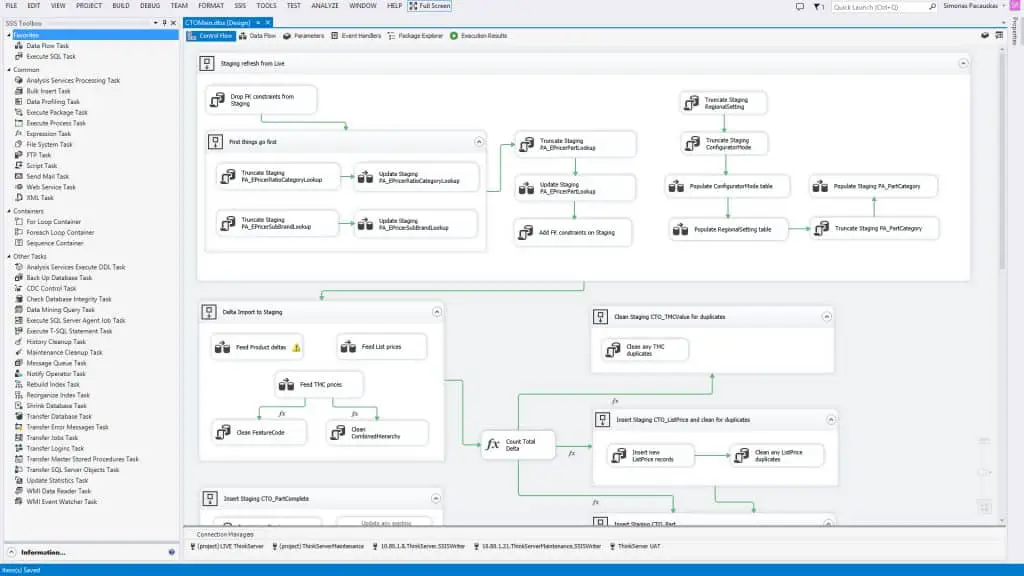
Skill Requirement #4: SQL Server Analysis Services – 2 months
SQL Server Analysis Services, or in short, SSAS, is another major part of the SQL Server software stack. It is used for data analysis. When I was in a SQL Server Developer position, I had to provide managers with the ability to run data analysis, slice and dice the data.
The way SSAS works is simple. All you need to do is to create the SSAS project using Visual Studio, deploy to the server, then all the interested people can connect to the SSAS service from Microsoft Excel and then analyze the data.
SSAS is not hard to learn. It’s more about understanding various things about the SSAS and how to set up the solution.
Online course that will fast-forward your SSAS learning:
[wpsm_list type=”arrow”]
[/wpsm_list]
Skill Requirements: Based on Real Job Advertisement
Up until now, I wrote and described everything based on my own experience as a SQL Server Developer. Now it’s time to look at some real job advertisements on the job boards to see what skills companies are expecting from the candidates when they apply for the SQL Server Developer positions.
I searched on indeed.com for ‘junior SQL developer’, and I got dozens of results. One of them was based in New York City and had the following description.
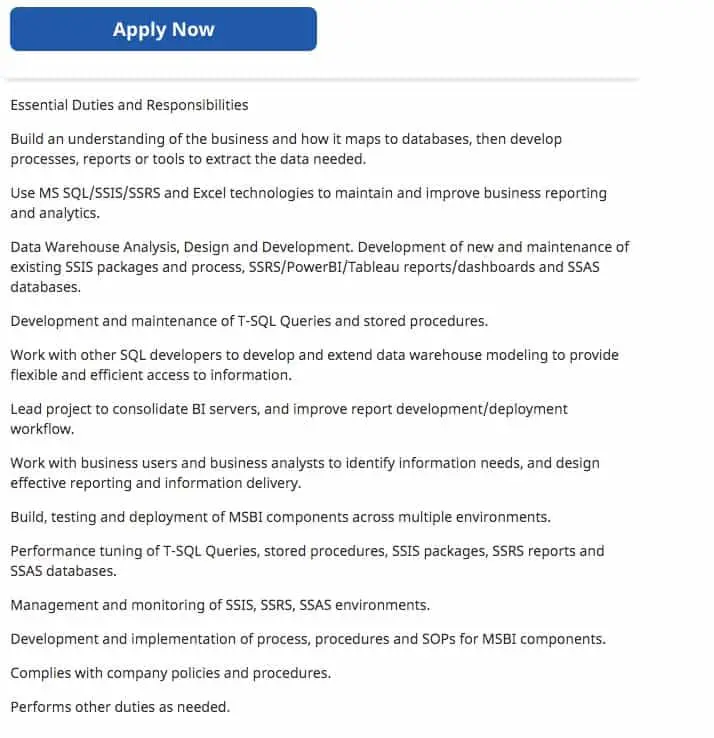
As you can see, you are expected to have knowledge of the whole SQL Server stack – SSRS / SSIS / SSAS. You are also required to know how to troubleshoot slow performing queries and do the performance tuning for those SQL queries.
Other than that, there’s also a requirement to have PowerBI and Tableau skills. Again, these tools are very popular and used by millions of companies around the world. There are plenty of online courses that can teach you all these skills, however, don’t take these requirements as must-haves. Usually they are nice-to-haves.
In case you’re aiming to learn the MAX before you apply for your desired job, all I can tell you is that learning PowerBI and the Tableau is straight-forward. For me, learning these two didn’t take longer than 1 month each, so 2 months.
Online courses that will fast-forward your PowerBI and Tableau learning:
[wpsm_list type=”arrow”]
- LinkedIn Learning – Power BI courses and learning paths
- LinkedIn Learning – Tableau courses and learning paths
[/wpsm_list]
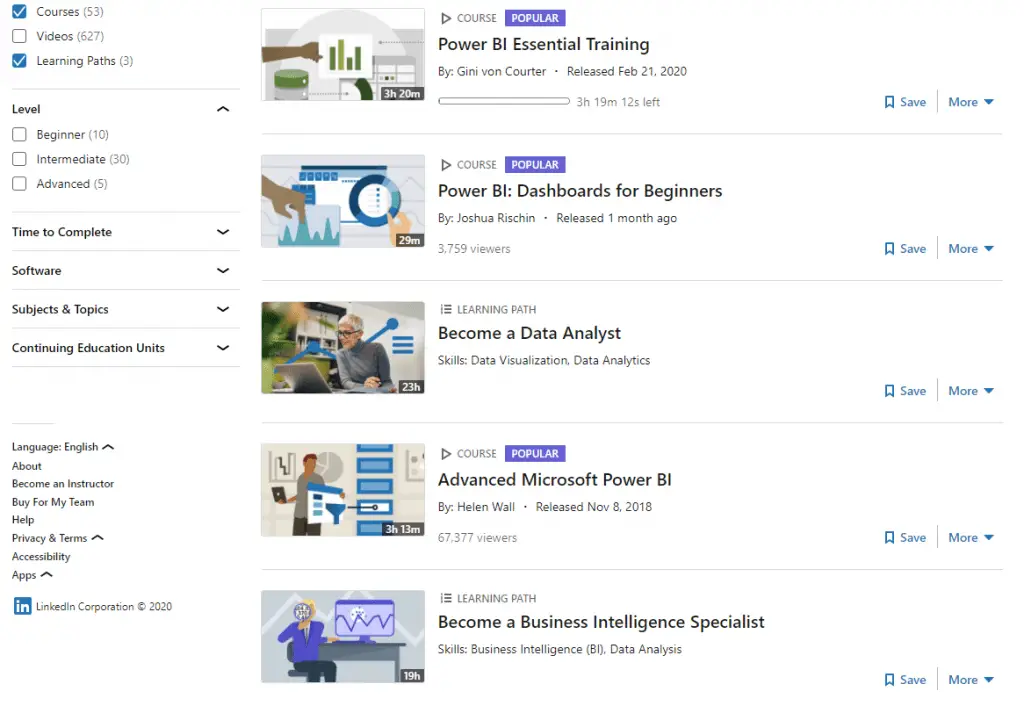
Final thoughts
It may seem like it’s a lot to learn. In reality, becoming a SQL Server Developer is one of the fastest ways to get into the IT area and the development in general. If you add up all the skills I mentioned in the article, it will total to around 8-9 months. Is that too long to get your desired job?

